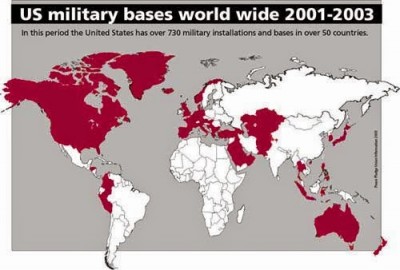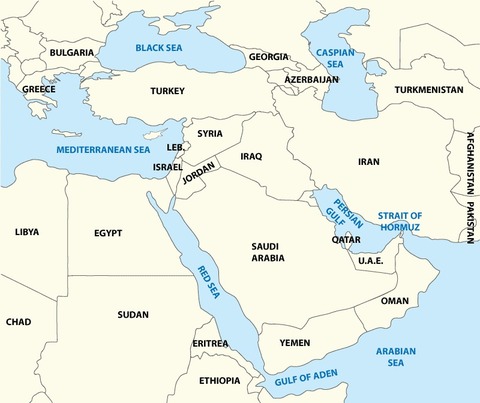War, Imperialism and the People’s Struggle in the Middle East
United States continues its occupation of the region

Since March 26 the Saudi Arabian monarchy along with its neighbors in the Gulf Cooperation Council (GCC) has been waging war on the nation of Yemen. Daily bombing raids against residential areas and infrastructure are ostensibly designed to push back the Ansurallah (Houthis) movement which has taken over large sections of the country, one of the most underdeveloped in the region.
This war has been largely hidden from the view of people inside the United States. Nonetheless, this is a U.S. war aimed at maintaining Washington’s dominant position within the Arabian Peninsula extending to the Horn of Africa and the Gulf of Aden.
Prior to the beginning of the airstrikes by the Saudi-GCC Coalition, the administration of President Barack Obama withdrew its diplomatic personnel along with Special Forces operating inside the country. For many years the Pentagon and the Central Intelligence Agency (CIA) has viewed Yemen as a key area for its so-called “war on terrorism.”
Regular drone strikes have killed many Yemenis along with at least three of whom were U.S. citizens. Washington has said that the Al-Qaeda of the Arabian Peninsula (AQAP) is major threat to American interests in an attempt to justify the drone attacks which have killed more civilians than supposed “armed combatants.”
However, in recent months the Islamic Republic of Iran has been designated by Washington and its allies as the principal threat in Yemen. The Ansurallah, which is a Shiite branch of Islam, is supported politically by Tehran. The Saudi monarchy views Iran as its major impediment in controlling the region on behalf of U.S. oil and financial interests.
The current hostilities in Yemen have been described as a proxy war between Saudi Arabia and the GCC on one side and Iran and its allies on the other. The total war strategy against Yemen consists of the banning of humanitarian assistance from Iran and others who oppose the bombing and ground offensive by militias which are financed by Riyadh.
According to an article published by the Telegraph in Britain, it says that “As Saudi Arabia has maintained an air and naval blockade on Yemeni territory, gas supplies have run perilously low. Even a five day humanitarian pause was not enough to bring in the necessary aid. Fuel prices have spiked as the casualty count mounts, and some hospitals have been forced to close altogether because they are unable to keep medical supplies refrigerated or perform operations since they can’t run backup generators.”
Reports of the number of Yemenis killed in the fighting range from 2,000-4,000 with many more injured and displaced. Yemeni-Americans who have been attempting to leave the country since late March have been abandoned by Washington.
Many Yeminis have taken refuge across the Red Sea and the Gulf of Aden into Djibouti where the U.S. has its largest military base in Africa. The U.S. Africa Command (AFRICOM) is expanding its operations at Camp Lemonnier which is utilized as a staging ground for military strikes inside Somalia and other countries on the continent.
This same above-mentioned Telegraph article also notes that
“The UNHCR says a total of 5,000 Yemeni refugees have made it to Djibouti, including 3,000 in the capital, Djibouti city, and 1,000 in Obock, 300 kilometers (187 miles) to the north — making it currently the biggest Yemeni refugee population. The influx has hiked up local prices, with markets, hotels, and drivers trying to make the most of the situation in an already struggling economy.”
Yemen and the Imperialist Regional War
The war in Yemen is part and parcel of a broader regional war that encompasses Syria, Iraq, Lebanon, occupied Palestine and Iran. In Iraq where the U.S. occupied the country for over eight years, the Pentagon has redeployed 3,100 troops to the area. These troops are purportedly training Iraqi military forces although the Defense Department cannot claim any real successes.
When Islamic State fighters confronted Iraqi units in Mosul and other cities they fled. A similar situation was reported in Ramadi in Anbar Province. The Obama administration played down these events in order to deflect the attention of the U.S. public away from its failures in Iraq.
The Kurdish fighters seem to have fought with far greater commitment and vigor yet they are not privy to the military assistance in their struggle against IS. Fierce battles in Kobane on the border with Turkey revealed that the Kurds were a force to be reckoned with in the regional war against IS.
In neighboring Syria, the U.S. is behind efforts to destabilize and overthrow the government of President Bashar al-Assad. Since 2011, an estimated 200,000 people have died and several million dislocated both inside and outside of Syria.
The U.S. is bombing both Iraq and Syria under the guise of degrading and destroying IS bases. However, the impact of this aerial war is to create broader avenues of operation for the IS forces which were built up during the initial years of the destabilization campaign against Syria. At present IS military units have seized large areas of territory within Syria and Iraq, while the strategy of the White House is to continue the bombing targeting Daesh but at the same time opposing the continued existence of the Assad government in Damascus.
A massive air assault on Syria was planned for August-September 2013. However, public outrage in Britain and the U.S. stopped the president in his tracks. The effect of recent wars waged by Washington through successive administrations has resulted in greater instability and dislocation.
In Lebanon Hezbollah has maintained its strength against the Zionist regime occupying Palestine. The party and mass movement have also intervened in solidarity with the people of Syria and may escalate its involvement based upon developments taking place inside the country.
The plight of Palestinians has been negatively impacted by the wars in Syria and Iraq. In Syria, many Palestinian refugees were divided over support for the Assad government. A major camp housing Palestinians has been the focal point of IS attacks seeking to gain control of the area.
Israel is supported to the tune of billions every year from the tax dollars of the American people. U.S. warplanes and other defense technology are given to Tel Aviv where it is tested against the people of Gaza and other occupied territories.
Although the U.S. administration has signed an agreement on Iran nuclear energy program, the Obama White House is continuing the 36 years of hostility towards Tehran since the popular revolution of 1979. Washington’s coordination of the Saudi-GCC war in Yemen is a clear testament to the ongoing war against Iran.
Africa and the Middle East
As we mentioned earlier, Djibouti, the pivotal staging ground for AFRICOM on the continent is located right across from Yemen. Somalia, Ethiopia, Egypt and Kenya are in close proximity. The artificial divisions between Africa and the so-called Middle East are merely constructs of colonialism and imperialism for the purpose dividing the regions in regard to spheres of influence for western powers.
Peoples who reside on either side of the Red Sea and the Gulf of Aden fundamentally want the U.S. out of their countries. They desire to live in peace and to determine their own destiny in the quest for development and unity. Washington and Wall Street dominate through their military prowess and economic machinations that bribe leaders making them dependent upon U.S. and European patronage and privilege.
The fueled hostility between various branches of Islam is indispensable in the imperialist strategy for the Middle East and Africa. Only when the peoples of Africa and the Middle East unite on an anti-imperialist basis will there be a genuine atmosphere of lasting peace and social stability.
Note: This paper was presented at the Left Forum held at John Jay College of Criminal Justice, City University of New York (CUNY) during May 29-31, 2015. The panel was chaired by Bill Dores of the International Action Center. Kazem Azin of Solidarity Iran was also a participant.


